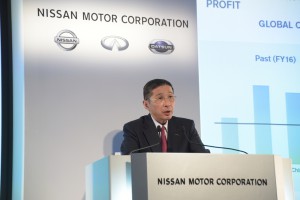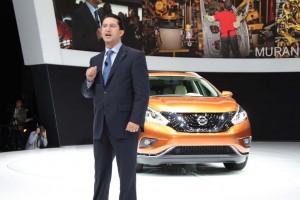
Nissan Motor Corp. CEO Hiroto Saikawa is coming under increasing pressure as Nissan’s fortunes fade,
Nissan will slash 12,500 jobs worldwide, significantly more than earlier reports from Japan had indicated.
The company also plans to reduce its production capacity by 10% over the next three years, while eliminating 10% of its current model mix.
“Our situation right now is extremely severe,” said CEO Hiroto Saikawa, during a news conference in Tokyo on Thursday morning. Saikawa tried to put an upbeat spin on the announcement by declaring that, “Our stance to lead the industry is unchanging.”
But the move is the most significant retrenchment by Japan’s second-largest automaker, and comes at a time when it is facing extensive internal turmoil, as well as questions about the long-term viability of its two decade-old alliance with French automaker Renault.
Thursday’s news conference brought a heavy dose of bad news for Nissan. The automaker had already suffered a sharp downturn during the fiscal year that ended March 31, global demand dipping 4.3%, to 5.22 million vehicles, while earnings were off 57%, to 319.1 billion yen, or $2.9 billion.
But the new fiscal year – which continues through March 31, 2020, has gotten off to an even worse start. Analysts had expected Nissan to deliver earnings of about $1.6 billion for the April-June quarter. Instead, Hiroto said, the results came in at a meager $59 million, or 6.4 billion yen, down from 115.8 billion yen during the first fiscal quarter of 2018.
(For more on Nissan’s weak 2018 fiscal year performance, Click Here.)

José Muñoz, Nissan’s former chief performance officer, is one of the many senior executives who have left the company in recent months.
The downturn reflects a variety of factors, said Christian Stadler, professor of strategic management at Warwick Business School, “The economic slowdown, which hit key markets such as the U.S. and China, the uncertainty surrounding Brexit, and the race to embrace new technology as the crackdown on diesel continues all contributed to Nissan’s fall in sales and will continue to do so.”
Demand was down in virtually all key markets, but Europe and North America have been particularly hard hit. Last month alone, sales of Nissan and Infiniti branded vehicles dipped 14.9%, a significantly sharper downturn than the overall U.S. market decline of around 2% for the year-to-date. For the full calendar year, demand has been off 14.9%, including both the Nissan and Infiniti brands.
Like other automakers, the second-largest of Japan’s automotive manufacturers has had to adapt to the shift from sedans, coupes, wagons and hatchbacks to light trucks. That puts passenger car models like the Versa and Sentra at risk as the company rationalizes its global line-up. But questions also center around the future of the Titan. Nissan’s big truck has largely failed to take advantage of booming demand for pickups in the U.S. market.
The weak performance is putting a spotlight on Saikawa, the one-time protégé of former CEO Carlos Ghosn. The chief executive was already under fire for his role in the arrest of Ghosn, the man who helped save Nissan from bankruptcy two decades ago, on corruption charges. A number of analysts, as well as some senior executives within Nissan, feel Saikawa helped orchestrate Ghosn’s take-down in order to prevent a possible takeover by alliance partner Renault.
(Nissan shoots down proposed Renault merger. Click Here for more.)

Nissan will eliminate 10% of its model line-up and small cars, such as Versa, could be particularly hard hit in the current, SUV-oriented market.
Since Ghosn was marched off his corporate jet and taken to the Tokyo Detention Center last November, an assortment of senior executives, including Chief Performance Officer Carlos Munoz, have either been fired or forced out.
Meanwhile, the future of the alliance – which also includes smaller Japanese carmaker Mitsubishi – has been under a cloud. The crisis also helped derail a planned Renault merger with Fiat Chrysler.
While many observers question whether Ghosn actually committed the numerous crimes he now has been accused of, his longer-term legacy is coming under question. He aggressively pushed Nissan to expand its model line-up, as well as its manufacturing base, in a bid to drive up sales, market share and margins. The Renault-Nissan-Mitsubishi Alliance has been one of the world’s largest automotive groups over the last several years, as a result.
But it now appears to be payback time. “This is really a crisis,” SBI Securities analyst Koji Endo told the Bloomberg news service. “Management is chaotic, there is a lot of restructuring pressure, and the most important thing here is to downsize. The company actually inflated too much under Carlos Ghosn.”
Nissan has yet to announce where the planned job and production cuts will take place. With North American demand down sharply, however, three massive production complexes, one in Smyrna, Tennessee, the others in Mexico, could be at risk, according to observers.
(Nissan recruits new design chief from Lincoln. Click Here for the story.)
